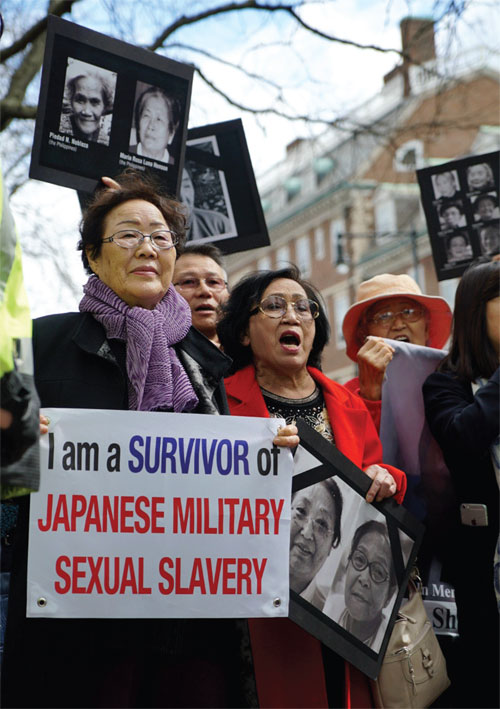Abe avoids protesters at Harvard
|
Protesters, including a former Korean "comfort woman", Yong Soo Lee, 88, demonstrate outside the Kennedy School of Government at Harvard University in Cambridge, Massachusetts, demanding that Japanese Prime Minister Shinzo Abe apologize for Japan's sexual enslavement of women in occupied countries during World War II. Zhou Erjie / Xinhua |
Japanese Prime Minister Shinzo Abe visited Harvard University and encountered protesters urging him to apologize for war crimes committed by Japan during World War II, especially to women from South Korea and China forced into sexual slavery during the war.
An estimated 150 students including Korean Americans participated in the protest Monday, according to UPI, bearing signs that read, "You can rewrite history, but you cannot rewrite the truth," and "Time is running out," a reference to the aging survivors. But Abe skirted the protesters by using a back entrance to Harvard's John F. Kennedy Jr. Forum in Cambridge, Massachusetts, where he gave a short speech.
Abe arrived in Boston on Sunday, on the 70th anniversary of the end of World War II, for week-long visit to the United States, including a meeting on Tuesday with US President Barack Obama and a speech to a joint session of Congress on Wednesday, -the first for a Japanese leader.
According to the Harvard Crimson, the university's newspaper, the protesters held an hour-long silent demonstration organized by Harvard students that, according to an open letter read at the demonstration, protested the Japanese government's "direct role in operating a system of sexual slavery during World War II." Eighteen Harvard student groups and 161 students signed the open letter, which demanded an acknowledgment of the "Japanese government's direct involvement in the operation of comfort stations."
Phyllis Kim, executive director of the Korean American Forum of California, was quoted by CBS-TV in Boston as saying that Abe still has not addressed any of the specific requests victims and advocates seek, including a formal government apology, legal reparations and punishment of those responsible.
"He basically repeated the denial and the evasion of responsibility that he has been saying all along," she said. "He only said he has 'heartache.' That stops short of apology."
In response to a question about "comfort women", a euphemism for the females forced into sex slavery to the Japanese military during the war, Abe told Harvard students through a translator:
"My heart aches when I think about the people that were victimized by human trafficking and who were subjected to immeasurable pain and suffering beyond description. We have very resolutely determined that, in the 21st century, women's human rights should not be violated."
Lee Yong-soo, 86, a South Korean activist and former comfort woman sat in a wheelchair and held a placard that read, "I am a survivor of Japanese military sexual slavery." She also wore a mask marked with a black "X" that symbolized the shaming and silencing of survivors of wartime camps.
Erik Gorard, a computer science student at Harvard, was quoted by Xinhua as saying he was "pretty disappointed" at Abe's answer, adding that the Japanese prime minister "definitely evaded that question a little bit."
"I don't think he will address the comfort women issue in any more detail" in his speech to Congress, Gorard said.
zhengxin@chinadaily.com.cn



















